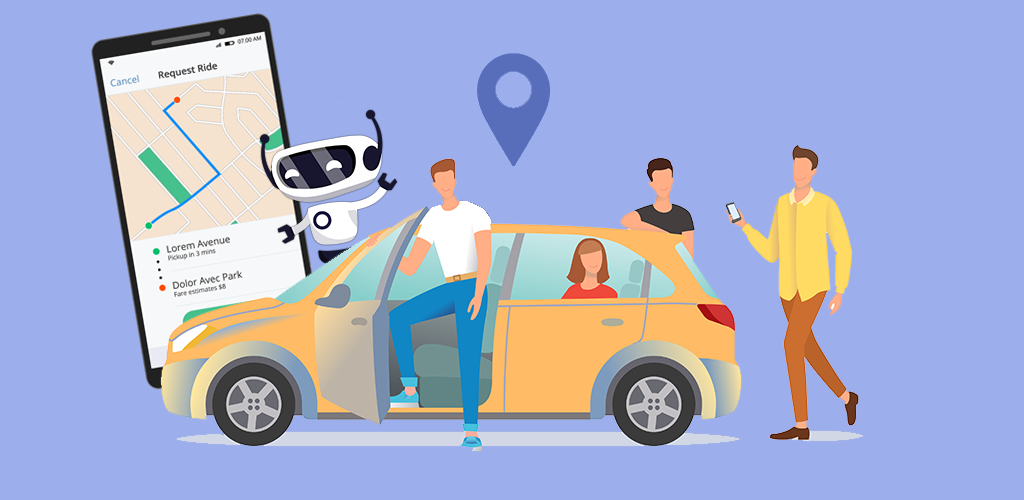October 20, 2020
Privacy Tip of the Week: Take Care with Ridesharing Services
Posted by Rhiannon

Two decades ago, the word “uber” meant “over and above.” The word “lift” simply referred to raising an object. Today, the terms are synonymous with ridesharing, thanks to companies like Uber and Lyft. For those who may not be familiar with the term, ridesharing is the digital world’s solution to taxi rides. Taxi rides are expensive, sometimes hard to hail, and don’t always operate in small towns. Rideshare services offer more convenience because drivers from anywhere can use their personal vehicles, rides are scheduled through an app, and prices are typically much lower, all of which makes them more accessible to a wide audience. However, despite their convenience, because ridesharing services operate in an online environment, the companies behind them often collect user data in a way that may harm your privacy. Here’s what to know about what they collect and how to protect yourself:
- What data is collected?
- How do companies use my data?
- How can I protect myself?
What Data Do Companies Collect?
In order to function properly, most ridesharing services require a lot of data about you. From the get-go, in order to sign up, you have to create a profile. Depending on the service you use, your profile may require your name, date of birth, email, and more. To confirm your identity (in order to protect you and their drivers), some apps may also ask you to connect to a social media account as well.
Ridesharing apps also require access to your location data, in order to send drivers to you. Unfortunately, once these apps are granted access, they may continue tracking you even after you close the app. There’s a lot of valuable information that services can learn from your location data, including your place of work, frequently visited locations, and more.
Finally, ridesharing services are cashless, meaning you pay through the app. To make this possible, you have to link a credit card (or similar payment method). Although this data should be encrypted, that doesn’t always guarantee complete and permanent security.
How Do Companies Use My Data?
Customer data on any app is useful. Some of it provides basic user statistics, such as the ages, genders, and locations of customers. Companies that know this information can better market to their existing audience while creating campaigns to audiences they don’t yet cater to. Companies may also use it as a way of making money, by selling it to third parties. Once in the hands of third parties, it’s hard to know exactly how your data may be used.
How Can I Protect Myself?
The best way of protecting yourself from ridesharing privacy breaches is to avoid ridesharing services altogether. They can’t steal your data if you never gave it in the first place. Unfortunately, this isn’t an option for many people. If you have to use a ridesharing service, there are a few ways of protecting your privacy:
- Turn Location Services Off: Once your ride has arrived, turn location services off. The app can’t track you if your GPS isn’t active.
- Only Give the Minimum of Information: Many apps include more information fields than they actually require. For example, some ask for an email and phone number, but one or the other is optional. Instead of giving both pieces of information, limit yourself to the mandatory minimum, just to make the app function.
- Research Apps: If your area has more than one ridesharing service to choose from, take some time and research your options. Check reviews, search the news for instances of known privacy breaches, and read the privacy policies of any company to see how they use your data.
- Opt Out: Some apps allow users to opt-out of data collection. If that’s an option, always opt-out.
- Use a Dedicated Credit Card: If you have more than one credit card, choose one to be your online-purchase card. This makes it easier to keep track of purchases and notice any unusual activity.
Ridesharing services aren’t the only online threat to your privacy. You can gain instant privacy anywhere online with a VPN service like HotBot, available for Windows now on our website or the Play Store or App Store.
Posted by Rhiannon
More Blog Posts
February 14, 2023
How the Investigatory Powers Act Impacts Citizen Privacy
In 2016, the United Kingdom passed the Investigatory Powers Act or IP Act, into law. This act empowered the government and related agencies to access and collect citizen data, without consent. Critics immediately slammed the new law. The media dubbed it the “Snoopers’ Charter.” Meanwhile, Edward Snowden described the act as “the most extreme surveillance […] Read moreFebruary 14, 2023
How to Easily Unblock Wikipedia with HotBot VPN
Wikipedia puts a wealth of information at your fingertips. Everything from the biography of Alexander Graham Bell to the basics of quantum computing can be instantly opened by curious browsers. But what happens when you can’t access that information? Whether a business network blocks it or a particular country censors it, don’t let that slow […] Read moreFebruary 14, 2023

